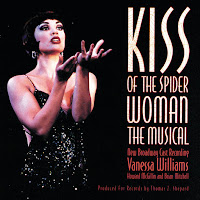ReDISCoveries: Kiss of the Spider Woman
(1994 Broadway Cast Recording) Part 2
Jeff has kindly invited me to revisit and review some of the older cast recordings in my collection. Every other week or so, I’ll write about a new CD, offering some general impressions followed by my thoughts about each individual song. This week’s entry is about the 1994 Broadway recording of Kander and Ebb’s Kiss of the Spider Woman.
One of the most striking things about Kiss of the Spider Woman is how much of it revolves around the fantasies of its two main male characters. Molina, of course, has organized his entire life around his memories of all those Aurora movies; it’s how he has survived a barren life both before and after being imprisoned. Although Valentin’s fantasies are less flamboyant, he, too, gets through life indulging in memories of his girlfriend Marta, his first lover, and his political rallies - all vividly recounted in musical numbers.
In fact, until the very end of the show, there is little traditional plot development and there are very few “real” characters aside from the prisoners and the warden. Not only Aurora but also Molina’s mother, his friend Gabriel, and Marta are seen almost exclusively through the cellmates’ dreams and fantasies (each one does appear for a few seconds during Molina’s brief moment of freedom late in the show). In the grand tradition of Kander and Ebb’s highly conceptual musicals, the show builds vibrancy, excitement, and momentum not through sophisticated plot but through the dramatic interplay of corporeal characters and ethereal memories.
When I was talking about this with Jeff recently, he pointed out how Molina and Valentin essentially switch roles during the course of the show with regard to the importance of fantasy vs. real-world action. At the start of the show, of course, Molina is entirely engrossed in his movies, while Valentin is a political radical imprisoned for his active engagement in the outside world. This begins to shift as each of them share their dreams and experiences. By the time we get to the “Russian movie” scene, each one has come to fully appreciate the other’s perspective: Valentin is a willing participant in one of Molina’s movie fantasies, but the theme of the movie itself reflects Valentin’s own political identity.
By the end of the show, the transformation is complete: it’s Molina who, inspired by Valentin’s affection, goes out into the world to accomplish something concrete; upon Molina’s return, Valentin betrays his own romantic fantasies when he begs Molina to save himself by telling what he knows. When Molina refuses to do so and is killed, Valentin’s spontaneous memorial (“his name was Molina”) precisely reflects Molina’s first words in the show (“her name is Aurora”).
THE SONGS
I use a star (*) to mark the songs I particularly like, and my overall favorite gets two
stars (**). This CD includes a few brief dialogue scenes, some with small bits of music; these aren’t listed separately below.
*I Do Miracles: With its leaping central motive (repeated by singers and orchestra alike) and its fitful chromatic melody, this song is another one of my favorites. (I sometimes forget how many favorites there are in this show!) Here, Aurora (Vanessa Williams) comes to Molina (Howard McGillin) to promise help for Valentin (Brian Stokes Mitchell), who then hears the same promise from Marta (Kirsti Carnahan). When the two women sing the tune together, it’s pure heaven.
Gabriel’s Letter/My First Woman: The cellmates each reminisce about their past, Molina about a straight retail worker (Jerry Christakos) he became enamored with (and who we will learn later is not as tolerant in reality as in Molina’s memory), and Valentin about his first sexual experience.
Morphine Tango: In what is surely K&E’s trippiest song, medical aides administer morphine to Molina, who has eaten poisoned food intended for Valentin. This little song leads directly to…
You Could Never Shame Me: In this gentle foxtrot, we hear the pure distillation of maternal love, as Molina’s mother (Mimi Turque) - or his image of her - assures him of her affection and pride. This quickly gives way to…
A Visit: The return of the cascading Spider Woman chords tells us that Aurora is appearing to Molina as his most dreaded character. Tellingly, she makes death seem like an erotic experience to be warmly anticipated - but it’s not time yet.
She’s a Woman: I’m not sure what to say about this song, which means of course that I’ll say a ton about it. On the one hand, the song itself is evocative and engaging, and it gives McGillin his clearest shot to show off his incredible skills as an actor-vocalist (that’s reason enough to justify its existence). On the other hand, it stops the plot cold just when the tension is starting to build.
I’ve gone through several phases with this song: as a 20-something, I thought it was just a pleasant bit of fluff that should be cut; somewhat later on, I thought it was emblematic of the widespread public confusion about the difference between gay people, transgender people, and cross-dressers (which I now realize is implausible given the show’s creative team). These days, I think it was an attempt to flesh out Molina’s tacit self-identity as a transgender woman, which I understand was fairly clear in Manuel Puig’s novel (which I haven’t read). That’s an awfully big weight to put on one song, and I still don’t think it’s necessary for the show to do that, but I’m glad it’s there nonetheless.
Gimme Love: Aurora states her personal credo in the title of another raucous “imaginary” number for her and her men. Its conclusion leaves Molina in a state of turmoil as the first act ends. It is a nice bonus that this song is more complete than the original, providing more of the thrilling dance music in the score.
Russian Movie/Good Times: Aurora plays against-type as a Russian countess in this long, complex number. As Molina nurses Valentin after a murder attempt, he narrates the plot of his favorite movie, with appearances by the cellmates themselves in a story that will presage the show’s final moments. Valentin, about a dying Aurora: “this is not death; this is ecstasy.”
The Day After That: In return for Molina’s kindness, Valentin opens up to him about his life and what has led him to be a political radical, in this stirring song that develops into an imagined workers’ rally.
Mama, It’s Me: The warden (Herndon Lackey) allows Molina to speak on the telephone to his mother, whose health is failing, which he does in this short and sweet little song. He learns he will be freed soon.
Anything For Him: The Spider Woman and her chords are back, as the warden and Valentin begin to ensnare Molina in their separate traps, which she knows will lead him into her web for a final kiss. The melody here is obsessive and repetitious as the scheming unfolds, culminating with Valentin’s offer of sex that he knows will help persuade Molina to deliver a message for him when he’s released.
**Kiss of the Spider Woman: This song, which finally brings together musical themes that have been heard separately earlier in the score, gives the star her best opportunity to show off her vocal and physical abilities. The evocative and pliant accompaniment, the dramatic pauses, the surprise modal shift at the end - not to mention Williams’ bravura performance - gang up to make this a title song for the books.
Lucky Molina/Over the Wall: The prisoners express their jealousy over Molina’s escape as the warden watches him fulfill his own scheme to use Molina to discover Valentin’s secrets. Molina visits his mother, his work friend, and Gabriel, but finds his old life unsatisfying after his intimate encounter with Valentin; finally, he calls an unreceptive Marta with an encoded message from her lover. (This song was not included on the original recording, and its presence helps significantly in clarifying the show’s climax.)
*Only in the Movies: Molina is caught and brought back to prison, where the warden threatens to kill him if he doesn’t tell what he knows. Despite Valentin’s exhortations, Molina refuses to betray his beloved and is shot. Suddenly Molina himself is in a cinematic pastiche as he recalls what he’s gained and lost by living his life as if it were a movie, and how Valentin’s affection has redeemed him at the last possible moment - all with his own Hollywood ensemble for accompaniment. Who would have thought something so fanciful would be the perfect ending to such a brutal story?











.jpeg)













